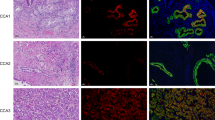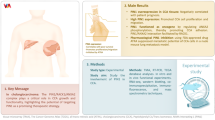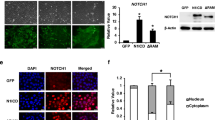Abstract
This study aimed to investigate the expression of protein regulator of cytokinesis 1 (PRC1) in cholangiocarcinoma (CHOL) and elucidate its potential impact as well as the underlying mechanisms governing the progression of CHOL. In this study, we used CHOL cells (HUCCT1, RBE, and CCLP1) and conducted a series of experiments, including qRT-PCR, cell counting kit-8 assays, EdU assays, flow cytometry, wound healing assays, Transwell assays, western blotting, double luciferase assays, and ELISA. Subsequently, a mouse model was established using cancer cell injections. Haematoxylin–eosin staining, along with Ki67 and TUNEL assays, were employed to assess tissue histopathology, cell proliferation, and apoptosis. Our findings revealed significantly elevated PRC1 expression in CHOL. According to bioinformatics analysis, it was found that the increased PRC1 level is correlated with the high tumour grades, metastases, and unfavourable prognoses. Notably, PRC1 knockdown inhibited cell viability, proliferation, migration, and invasion while promoting apoptosis in CHOL cells. Analysing TCGA-CHOL data and utilising transcription factor prediction tools (hTFtarget and HumanTFDB), we identified that genes positively correlated with PRC1 in TCGA-CHOL intersect with predicted transcription factors, revealing the activation of PRC1 by forkhead box protein M1 (FOXM1). Moreover, PRC1 was found to exert regulatory control over glycolysis and the mammalian target of rapamycin complex 1 (mTORC1) pathway in the context of CHOL based on KEGG and GSEA analysis. Collectively, these results underscore the pivotal role of PRC1 in CHOL progression, wherein it modulates glycolysis and the mTORC1 pathway under the regulatory influence of FOXM1.







Similar content being viewed by others
Availability of data and material
The datasets used and analysed during the current study are available from the corresponding author on reasonable request.
References
Krasinskas AM. Cholangiocarcinoma. Surg Pathol Clin. 2018;11:403–29.
Sarcognato S, Sacchi D, Fassan M, et al. Cholangiocarcinoma. Pathologica. 2021;113:158–69.
John ES, Tarnasky PR, Kedia P. Ablative therapies of the biliary tree. Transl Gastroenterol Hepatol. 2021;6:63.
Ben Khaled N, Jacob S, Rossler D, et al. Current state of multidisciplinary treatment in cholangiocarcinoma. Dig Dis. 2021.
Acquisto S, Iyer R, Rosati LM, et al. Cholangiocarcinoma: treatment, outcomes, and nutrition overview for oncology nurses. Clin J Oncol Nurs. 2018;22:E97–102.
Zhou CJ, Wang DH, Kong XW, et al. Protein regulator of cytokinesis 1 regulates chromosome dynamics and cytoplasmic division during mouse oocyte meiotic maturation and early embryonic development. FEBS J. 2020;287:5130–47.
Jiang W, Jimenez G, Wells NJ, et al. PRC1: a human mitotic spindle-associated CDK substrate protein required for cytokinesis. Mol Cell. 1998;2:877–85.
Li J, Dallmayer M, Kirchner T, Musa J, Grunewald TGP. PRC1: linking cytokinesis, chromosomal instability, and cancer evolution. Trends Cancer. 2018;4:59–73.
Hanicinec V, Brynychova V, Rosendorf J, et al. Gene expression of cytokinesis regulators PRC1, KIF14 and CIT has no prognostic role in colorectal and pancreatic cancer. Oncol Lett. 2021;22:598.
Bu H, Li Y, Jin C, et al. Overexpression of PRC1 indicates a poor prognosis in ovarian cancer. Int J Oncol. 2020;56:685–96.
Liang Z, Li X, Chen J, et al. PRC1 promotes cell proliferation and cell cycle progression by regulating p21/p27-pRB family molecules and FAK-paxillin pathway in non-small cell lung cancer. Transl Cancer Res. 2019;8:2059–72.
Li X, Li J, Xu L, et al. CDK16 promotes the progression and metastasis of triple-negative breast cancer by phosphorylating PRC1. J Exp Clin Cancer Res. 2022;41:149.
Raggi C, Taddei ML, Rae C, Braconi C, Marra F. Metabolic reprogramming in cholangiocarcinoma. J Hepatol. 2022;77:849–64.
Lu S, Ke S, Wang C, et al. NNMT promotes the progression of intrahepatic cholangiocarcinoma by regulating aerobic glycolysis via the EGFR-STAT3 axis. 2022; 11:39.
Jia M, Yang F, Xu Y, et al. Baicalin induced apoptosis of human cholangiocarcinoma cell through activating AMPK/mTORC1/p70S6K signaling pathway. Bull Exp Biol Med. 2022;173:366–70.
Lu X, Peng B, Chen G, et al. YAP accelerates notch-driven cholangiocarcinogenesis via mTORC1 in mice. Am J Pathol. 2021;191:1651–67.
Li X, Yu C, Luo Y, et al. Aldolase A enhances intrahepatic cholangiocarcinoma proliferation and invasion through promoting glycolysis. Int J Biol Sci. 2021;17:1782–94.
Fujinaga A, Hirashita T, Hirashita Y, et al. Glucose metabolic upregulation via phosphorylation of S6 ribosomal protein affects tumor progression in distal cholangiocarcinoma. BMC Gastroenterol. 2023;23:157.
Squadroni M, Tondulli L, Gatta G, Mosconi S, Beretta G, Labianca R. Cholangiocarcinoma. Crit Rev Oncol Hematol. 2017;116:11–31.
Mazzaferro V, El-Rayes BF, Droz Dit Busset M, et al. Derazantinib (ARQ 087) in advanced or inoperable FGFR2 gene fusion-positive intrahepatic cholangiocarcinoma. Br J Cancer. 2019;120:165–71.
Jensen LH, Lindebjerg J, Ploen J, Hansen TF, Jakobsen A. Phase II marker-driven trial of panitumumab and chemotherapy in KRAS wild-type biliary tract cancer. Ann Oncol. 2012;23:2341–6.
Zhang B, Shi X, Xu G, et al. Elevated PRC1 in gastric carcinoma exerts oncogenic function and is targeted by piperlongumine in a p53-dependent manner. J Cell Mol Med. 2017;21:1329–41.
Li H, Long J, Xie F, et al. Transcriptomic analysis and identification of prognostic biomarkers in cholangiocarcinoma. Oncol Rep. 2019;42:1833–42.
Wang Q, Lu S, Chen Y, He H, Lu W, Lin K. Analysis of transcriptome in the relationship between expression of PRC1 protein and prognosis of patients with cholangiocarcinoma. J Int Med Res. 2021;49:300060521989200.
Wierstra I, Alves J. FOXM1, a typical proliferation-associated transcription factor. Biol Chem. 2007;388:1257–74.
Li M, Yang J, Zhou W, et al. Activation of an AKT/FOXM1/STMN1 pathway drives resistance to tyrosine kinase inhibitors in lung cancer. Br J Cancer. 2017;117:974–83.
Gao Y, Xu D, Li H, et al. Avasimibe dampens cholangiocarcinoma progression by inhibiting FoxM1-AKR1C1 signaling. Front Oncol. 2021;11:677678.
Hsieh CH, Chu CY, Lin SE, Yang YSH, Chang HS, Yen Y. TESC promotes TGF-alpha/EGFR-FOXM1-mediated tumor progression in cholangiocarcinoma. Cancers (Basel). 2020; 12.
Klinhom-On N, Seubwai W, Sawanyawisuth K, et al. FOXM1c is the predominant FOXM1 isoform expressed in cholangiocarcinoma that associated with metastatic potential and poor prognosis of patients. Heliyon. 2021;7:e06846.
Pant K, Richard S, Peixoto E, Gradilone SA. Role of glucose metabolism reprogramming in the pathogenesis of cholangiocarcinoma. Front Med (Lausanne). 2020;7:113.
Thonsri U, Seubwai W, Waraasawapati S, et al. Overexpression of lactate dehydrogenase A in cholangiocarcinoma is correlated with poor prognosis. Histol Histopathol. 2017;32:503–10.
Ma P, Xing M, Han L, et al. High PD-L1 expression drives glycolysis via an Akt/mTOR/HIF-1α axis in acute myeloid leukemia. Oncol Rep. 2020;43:999–1009.
Yan X, Yang C, Hu W, et al. Knockdown of KRT17 decreases osteosarcoma cell proliferation and the Warburg effect via the AKT/mTOR/HIF1α pathway. Oncol Rep. 2020;44:103–14.
Fan Z, Zheng W, Li H, et al. LOXL2 upregulates hypoxia-inducible factor-1α signaling through Snail-FBP1 axis in hepatocellular carcinoma cells. Oncol Rep. 2020;43:1641–9.
Cheng H, Hao Y, Gao Y, et al. PLCε promotes urinary bladder cancer cells proliferation through STAT3/LDHA pathway-mediated glycolysis. Oncol Rep. 2019;41:2844–54.
Shi J, Ye J, Fei H, et al. YWHAZ promotes ovarian cancer metastasis by modulating glycolysis. Oncol Rep. 2019;41:1101–12.
Xu L, Li Y, Zhou L, et al. SIRT3 elicited an anti-Warburg effect through HIF1alpha/PDK1/PDHA1 to inhibit cholangiocarcinoma tumorigenesis. Cancer Med. 2019;8:2380–91.
Hong ZF, Zhang WQ, Wang SJ, et al. Upregulation of DPY30 promotes cell proliferation and predicts a poor prognosis in cholangiocarcinoma. Biomed Pharmacother. 2020;123:109766.
Joechle K, Jumaa H, Thriene K, et al. Dual inhibition of mTORC1/2 reduces migration of cholangiocarcinoma cells by regulation of matrix metalloproteinases. Front Cell Dev Biol. 2021;9:785979.
Cui XD, Lee MJ, Kim JH, et al. Activation of mammalian target of rapamycin complex 1 (mTORC1) and Raf/Pyk2 by growth factor-mediated Eph receptor 2 (EphA2) is required for cholangiocarcinoma growth and metastasis. Hepatology. 2013;57:2248–60.
Lien EC, Lyssiotis CA, Cantley LC. Metabolic reprogramming by the PI3K-Akt-mTOR pathway in cancer. Recent Results Cancer Res. 2016;207:39–72.
Yokoi K, Kobayashi A, Motoyama H, et al. Survival pathway of cholangiocarcinoma via AKT/mTOR signaling to escape RAF/MEK/ERK pathway inhibition by sorafenib. Oncol Rep. 2018;39:843–50.
Acknowledgements
None.
Funding
This study was supported by the Linyi Science and Technology Development Plan project (202120067).
Author information
Authors and Affiliations
Contributions
CZ designed the study; CZ performed the research; CQ analysed data, and wrote the paper.
Corresponding author
Ethics declarations
Conflict of interest
The authors declare that they have no conflicts of interest.
Ethics approval and consent to participate
All methods were carried out in accordance with relevant guidelines and regulations of the Declaration of Helsinki. The studies involving human participants were reviewed and approved by the Ethics Committee of Shandong Provincial Hospital Affiliated to Shandong University (SWYX: NO. 2022-317). The patients/participants provided their written informed consent to participate in this study. The experimental protocol of our study was performed in accordance with the Guide for the Care and Use of Laboratory Animals and approved by Shandong Provincial Hospital Affiliated to Shandong University (No. 2023-078).
Additional information
Publisher's Note
Springer Nature remains neutral with regard to jurisdictional claims in published maps and institutional affiliations.
Rights and permissions
Springer Nature or its licensor (e.g. a society or other partner) holds exclusive rights to this article under a publishing agreement with the author(s) or other rightsholder(s); author self-archiving of the accepted manuscript version of this article is solely governed by the terms of such publishing agreement and applicable law.
About this article
Cite this article
Zhang, C., Qin, C. Protein regulator of cytokinesis 1 accentuates cholangiocarcinoma progression via mTORC1-mediated glycolysis. Human Cell 37, 739–751 (2024). https://doi.org/10.1007/s13577-024-01032-7
Received:
Accepted:
Published:
Issue Date:
DOI: https://doi.org/10.1007/s13577-024-01032-7




